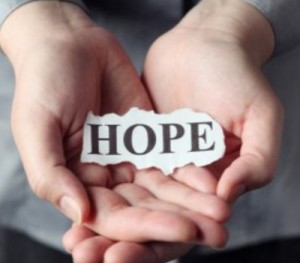Healthcare And The Importance Of Hope
 Hope is a tricky thing. On the one hand, false hope can lead patients to opt for painful, futile treatments at the end of life. On the other, unnecessarily bleak outlooks can lead to depression and inaction. When health is at stake, presenting information with the right amount of hope can guide patients away from both suffering needlessly and/or succumbing to treatable disease.
Hope is a tricky thing. On the one hand, false hope can lead patients to opt for painful, futile treatments at the end of life. On the other, unnecessarily bleak outlooks can lead to depression and inaction. When health is at stake, presenting information with the right amount of hope can guide patients away from both suffering needlessly and/or succumbing to treatable disease.
I was reading a sad story about a patient whose physician had made her feel hopeless. She was an elderly widow with some real, but not immediately life-threatening, medical conditions. His attitude led her to believe that she was sick and useless – with little to look forward to but ongoing testing, disease progression and eventual death. His professional opinion held special weight for her, coloring her entire outlook. It wasn’t until a friend reminded her of the doctor’s fallibility that she began to question her diagnoses, treatment options, and even prognosis.
When faced with concerning new medical diagnoses, even the most educated among us tend to imagine the worst case scenario. Knowing this, physicians should take care to offer reassurance and optimism whenever it is warranted. Hope provides the energy to course correct, to fight battles that can be won, and to hold on to trust in a brighter future. Why be stingy with it when it is so easily given?
As a rehab physician I have regularly encountered bias on the part of healthy people in regards to certain injuries. I hear them whisper, “I wouldn’t want to go on living if I couldn’t walk” or “That poor man’s life must be ruined.” And yet, these feelings are not shared by those fighting the battles. In many cases, losing an ability focuses the mind on what’s important – and on all the things that can still be achieved and enjoyed. Life is a gift, and while we all still have breath – we can make meaningful contributions.
It breaks my heart to see patients lose hope, and it is sadder still when physicians facilitate the loss. What we say carries psychological weight, and we should recognize the duty we have to deliver information with kindness and respect – focusing on the possible, dispelling unreasonable fears, and emphasizing that inner peace is attainable no matter the circumstance.
In healthcare we ought to always have hope – not for perfect health, or longer life – but in our ability to overcome obstacles, to make good come from bad, and to have a positive impact on others. The choice to live our best life is ours to make, no matter the disease or condition. Never let a doctor steal your hope, but adopt the rehab mission: to add life to years.













